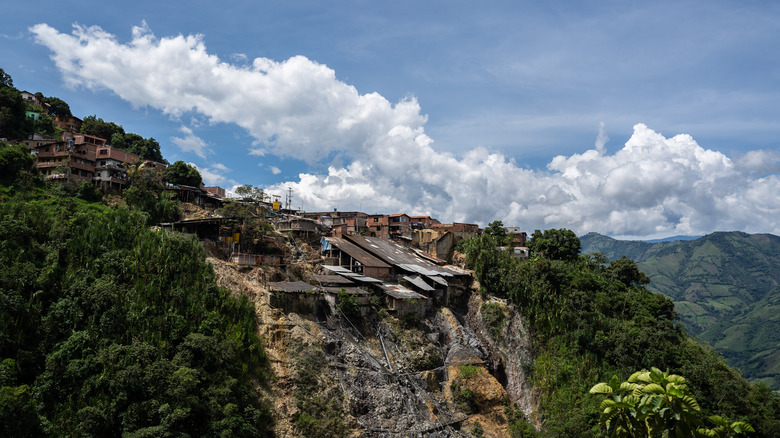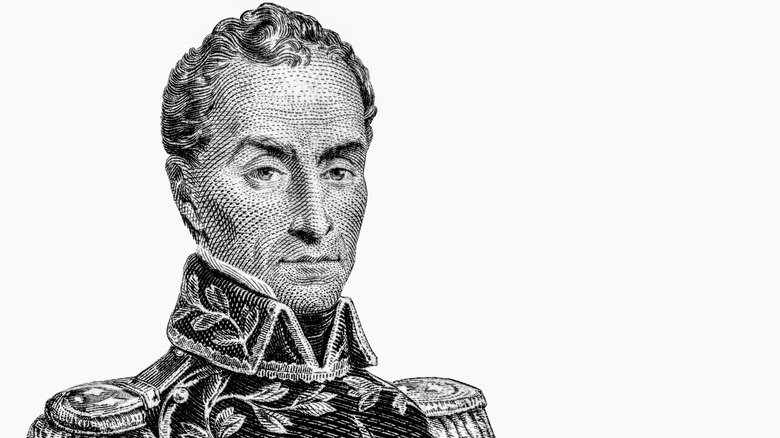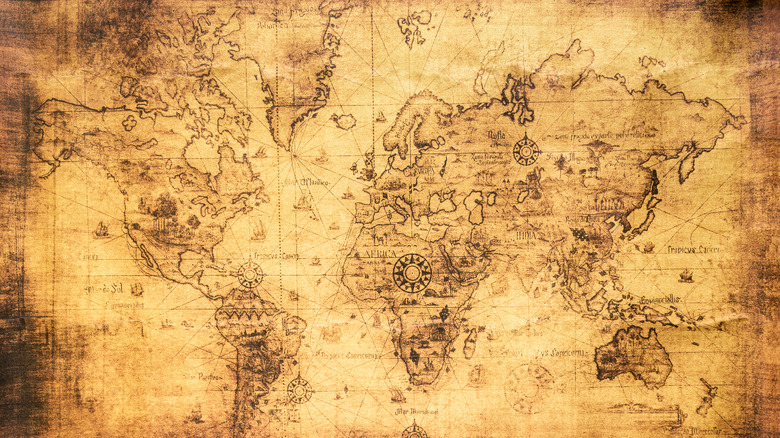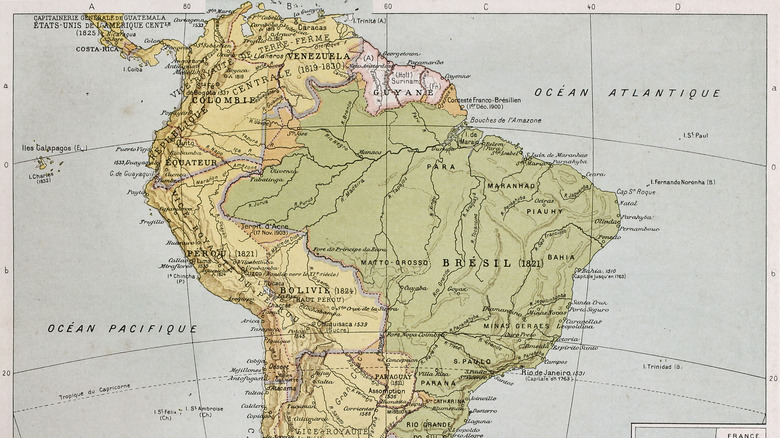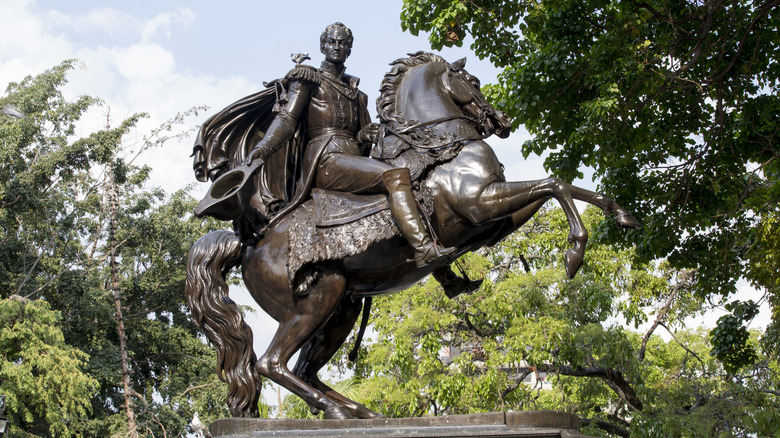The Story Of Gran Colombia, The Super Country That Collapsed In Just 12 Years
It is said that powerful empires last about 250 years, but the story of Gran Colombia certainly shatters that stereotype. Poised to be a superpower in the early 1800s, Gran Colombia reigned freely for a mere 12 years before finally collapsing into the territories we now recognize as Panama, Colombia, Ecuador, and the Bolivarian Republic of Venezuela (via Britannica).
The term "Bolivarian Republic" makes a lot more sense if you know the hidden history of Gran Colombia, the super country that dissipated into dust. This is because Spanish soldier turned short-lived dictator Simon Bolivar is at the heart of the country's foundation and also the center of its collapse (per Biography). To that end, the tale of Gran Colombia is one of liberation, revolution, tenacity, and woe. It exists as a testament to the fine line between bravery and tyranny, as evidence of what happens when great soldiers rise up and become terrible leaders.
Gran Colombia was the product of Simon Bolivar's ambition and unified vision
According to Britannica, an ambitious soldier hailing from Spanish aristocracy by the name of Simon Bolivar led a revolution for South America's northernmost territories and sought independence from the reign of Spain. He was ultimately successful in his endeavor, fueled by a vision of freedom and unity for the territories he later led. However, it was that same tenacity he needed to lead the resistance that inevitably caused his political leadership to fail.
Biography reports that Bolivar was born into affluence, profiting greatly from the gold and copper mines his parents owned in Venezuela. While influence and affluence were second-nature to the soldier, his personal life was wrought with tragedy. On his way to founding Gran Colombia, he lost both his parents to what was presumably tuberculosis (via Oxford Academic). Then in 1803, at just 20 years of age, his new bride, María Teresa Rodríguez, whom he wed in 1802, tragically died of yellow fever.
Bolivar sought comfort in some of the oddest possible places — the companionship of Napoleon Bonaparte and the battlefields of the resistance movement. While he went on to unite many Spanish territories, freeing them from the rule of Spain, his actions proved futile in the face of internal disagreement, and his rising superpower country ultimately dismantled itself.
Founded in 1819, Gran Colombia was regarded as one of the world's most powerful countries
According to Knowledgia, the country of Gran Colombia was highly regarded at its inception, with U.S. Secretary of State John Quincy Adams hailing it as "one of the most powerful countries across the globe." This was certainly high praise for Simon Bolivar, who sought to set up a bicameral legislature quite similar to that of the United States of America (via Britannica). But while countries like the U.S. were raving over the promise of the newly established Gran Colombia, European nations like Russia, France, and Austria refused to acknowledge Gran Colombia as an independent country, seeking to assimilate its government into one of a European-inspired monarchy.
In times of military conflict, Gran Colombia was perceived as a powerful force to be reckoned with, but once the dust of battle cleared, its fate grew murky. Wars for freedom aside, Gran Colombia suffered an irreconcilable conflict from within, as political figureheads and war heroes bickered about how to govern the new country.
The new nation was divided regionally and politically
Shortly after the wheels of revolution halted, the seeds of discord were sewn. In 1819, after Simon Bolivar's victorious military conquests, Gran Colombia was officially declared the Republic of Colombia (via History Matters). In fact, it was never referred to as Gran Colombia until long after the country's abolishment, a moniker used to avoid confusing it with modern-day Colombia (per Britannica).
Prior to Bolivar's conquest, this territory had been known as the Viceroyalty of New Granada, which was actually a scattered group of individual regions that rarely interacted politically or otherwise. Unifying an already-divided nation would prove even more difficult than pushing out Spanish forces. Incidentally, Bolivar was taking on both of these tasks simultaneously. He was also the president of Gran Colombia, a title that was widely disputed by people he had originally taken as allies in his cause.
As the new structure of government became subject to further divide, opponents from all sides of the political spectrum began closing in on then-president Bolivar, whose true intention was to rule over the territory as a kind of life-long dictator.
In the end, this would-be superpower dismantled itself from within
Divide and conquer is a tactic tried and true, one that often yields vast results with very little effort from outside parties. According to History Matters, in the case of Gran Colombia, this newfound land was already divided through both borders and ideologies. As Simon Bolivar gained power, the land he was conquering expanded, and he had to enlist fellow supporters of the resistance movement to powerful positions as his supporting staff.
In an odd twist of fate, these newly elected officials did not support Bolivar in the way he had envisioned, as second fiddles to his lifelong dictatorship or "presidency" over the country. To be fair, Bolivar's vision of a strong central government was rooted more in fear of civil war than an insatiable thirst for power, but his motives mattered not to these other politicians. They sought the federation of Gran Colombia and a shift in power that could even turn the area into three completely separate entities.
Knowledgia reports that fierce Venezuelan leader José Antonio Páez, who Bolivar had elected chief commander, was staunchly opposed to the idea of centralized government and fought to oppose it. In a short time, everyone in a powerful position had turned on then-president Bolivar, including Vice President Francisco de Paula Santander, Bolivar's lifelong friend (via Totally History).
Gran Colombia's founder Simon Bolivar died shortly afterward
According to NPR, in his heyday, Simon Bolivar was hailed the "George Washington of Venezuela," but with a staunch opposition to slavery. Bolivar believed that freedom and power could be found through the ties of unity rather than the chains of slavery. While many of his beliefs were modest and forward-thinking, his botched execution of those thoughts gave way to animosity, with some of his most trusted allies attempting to assassinate him (via Knowledgia).
History Matters reports that in 1830, Bolivar walked out on the crumbling country that was once his lifelong muse. Interestingly enough, former friend and Vice President Francisco de Paula Santander, who Bolivar had banished to exile for partaking in the assassination plot, returned to reign yet again, this time as President of New Granada — the region we now recognize as Panama and Colombia (via Totally History).
Former freedom fighter Bolivar's fate took a different turn, and he passed away the same year his great nation was abolished from what was purportedly tuberculosis. However, Science Daily professor Philip A. Mackowiak said that Paul G. Auwaerter — also a professor — "makes a compelling case for chronic arsenic intoxication complicated by bronchiectasis and lung cancer." Mackowiak has suggested using modern diagnostic techniques to decipher a concrete cause of death. Until then, Bolivar's country remains a piece of hidden history, and his death a mystery for the masses to ponder.
